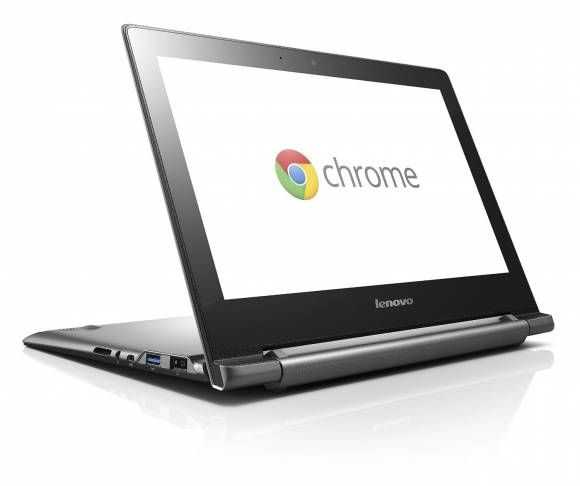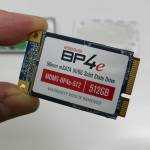I bought an Acer E11 Windows laptop. It’s pretty much an Acer C3 Chromebook running Windows. Same N2840 CPU. Same 2GB of RAM. Same 32GB eMMC SSD. Same weight and sizing. Over the last two days I’ve tested it hard and now have my first set of thoughts about the Windows vs Chromebook experience. I’ll go deeper into this topic over time and add videos and long-term thoughts as my experience grows but I wanted to get thoughts out there as soon as possible to help people in the run up to holiday-season buying. This could be one of the most interesting market fights we’ve seen since Android and IOS. Chromebooks and the new wave of Windows netbooks fit different user types, but do the potential customers know that?
First-off, lets highlight a couple of Windows issues that won’t go away soon. Updates, indexing and virus checking on a Windows PC can kill the user experience for days after the first switch-on. I’ve completed three reboots and had to uninstall the McAfee trail software because it’s just too heavyweight for the system. I’m left with Windows Defender which is the built-in, but relatively poor-quality, anti-virus solution. If there’s one nagging feature of a Windows laptop it’s anti-virus and for anyone that wants to minimize this risk, try to move to a Chromebook. After 48 hours though the Windows system has settled down. Boot time is under 20 seconds and return from standby is as instant as on a Chromebook. It’s smooth and it’s probably got a lot to do with the SSD. It’s only a cheap one but it beats a hard drive-based Windows PC hands-down.
The second instantly noticeable problem with Windows is OS-creep. On first-boot I saw 8GB free from a 32GB drive. After just 24 hours it was down to 4GB and there was no easy way to see how that had happened or to clean it up. 10GB of the drive is taken up with a firmware image. It’s possible to shift this off onto a USB stick but it’s not obvious how you might do that. Windows really needs an easy clean-up option on these small-drive systems. Chromebooks are almost worry-free when it comes to storage.
Battery life is no worse on the Windows laptop. You might be surprised to hear that but because Windows 8 and the new SoCs work so well together they can reduce power usage just as well as a Chromebook can. This 36 Wh battery will give you 7 hours of browsing and up to 10 hours of H.264 video viewing. You won’t get anywhere near that on the old Windows 7 / HDD combination. The battery life argument for Chromebooks does not carry much weight and with some Windows device supporting Connected Standby, there’s an argument for Windows here
Memory usage on a Windows laptop is higher than on a Chromebook but the important thing is how the two devices start to swap memory out into temporary storage when ‘real’ memory has run out. Windows has a complex algorithm of prediction, sharing and pre-loadingand it does work well after a while but a large part of the mechanism is a file on the disk that can be used when real memory runs out. Pagefile speed relies on disk speed and disk speed is always, relative to memory speed, slow. The user experience on a Windows PC dives when main RAM is low. Chromebooks, on the other hand, use a memory compression technology that’s faster and much more graceful from a user perspective. The fact is that not only is ChromeOS lighter on memory usage, it does a faster job of swapping using compressed data storage in RAM.
Minecraft and Skype are the two applications that cause the biggest barrier for the potential Chromebook consumer. Yes, you can get it working with some hacks but let’s not get into that because a consumer wants the simplest of experiences, not a set of hacks. Skype on Windows RT is light and always-on capable due to the Connected Standby mode on some low-cost Windows devices. That’s a big advantage, especially when you think about mobility and 3G connectivity. There are also hundreds, maybe thousands of examples of desktop applications that are ‘must-haves’ for current Windows users. Getting those users to change is a tough, tough job and will work in netbook’s favor.
Networking and network storage on a Windows PC is more flexible. It’s not simple sometimes but if you’ve got a NAS with 1TB of photos and videos on it a Windows PC will be able to access it where the Chromebook can’t. Setting up a Windows PC as a router or hotspot is also possible without too much trouble. Sharing a directory over a network from a Windows PC is easier than on a Chromebook. Windows PCs also support DLNA out of the box and File History does a good job of archiving user files, even over a network drive.
Security and privacy are an issue on Windows and that’s why there’s a virus-checker built into every PC. Secure boot helps and some of the new Windows 8.1 devices come with disk encryption enabled but the security model on a Chromebook is better. Everything that runs is sandboxed unless given permissions by the user. The secure boot process goes further than the Windows model where you can actually turn secure boot off while leaving all the personal files on the system. There’s a Power Wash feature on ChromeOS that will clean your system in 60 seconds. The same feature on Windows takes 10 minutes and that’s assuming you’ve been running an encrypted file system. If not, it can take hours. One could argue that you need to trust Google before you can rate privacy on a Chromebook but both netbook and Chromebook have guest modes. Windows supports local accounts too. Windows has some very advanced features in the Pro versions but that’s not relevant here. My Windows 8 tablet security assessment is here and it applies to many of these netbooks. I’m still assessing ChromeOS security but from what i’ve seen so far, ChromeOS is better and certainly safer out of the box.
Video editing is an argument but the experience on a $200 Windows PC isn’t that thrilling. Yes, you can do some simple edits at 720p and there are some good apps that will help you do that but what do you do with the 1GB source file you had to load onto your Windows PC that had just 3GB free? The issue of file storage is a big one. Move to a large hard drive-based system and performance really drops as the hard drive is a huge bottleneck, power drain, noisy and less-than-rugged. The video editing argument isn’t one that will be significant to many people so let’s move on.
Upgrading a laptop might be easier on a Windows PC design than on a Chromebook and the reason is that many variants of a cheap Windows PC will be produced for different markets. Some will have 4GB RAM, some will have hard drives. It means that the mainboard is generally a little more flexible when it comes to upgrading. This won’t always be the case but it’s currently easier to find a low-cost Windows laptop with a SATA interface than a Chromebook with a SATA interface.
I’m not going to talk about performance at this stage because there are a lot of things to measure and to consider. Disk speed is more important on a Windows PC than on a Chromebook. WiFi performance more important on a Chromebook than on a Windows PC. In terms of browser performance though there’s little difference between the Acer Aspire E11 and the Acer CB3-111. Sunspider (single threaded) scores are (best of 2 runs) 487 ms vs 542 ms. I’ll do more work on the performance aspects and include thoughts about background processes which cause a Windows performance score to vary more than a Chromebook performance score. I will also consider that there are $200 Chromebooks that offer a Haswell-architecture processor. The Acer C720 offers an interesting proposition.

Other things to consider:
- USB device support
- Software Choice
- Microsoft Office (sometimes provided free for personal use with 1TB OneDrive.)
- Child-friendly and safe browsing options.
- Video format support (including licensed codecs such as AC3, DTS, MPEG2)
- Music Player synchronization (iTunes, for example.)
- Windows RT mode (sandboxed apps, better security model than desktop.)
- Windows 10 upgrade. (Free?)
- See our Chromebook issues report.
- See our Chromebook advantages report.
- Simplicity and stability over time
- TCO in education, SMB and enterprise markets
- Cloud services
- Software development
The Chromebook retains unique features over Windows at any price and the proposition for education and SMB markets is clear but it’s in the very vocal consumer market where Chromebook may have a problem. “Minecraft” sums up that particular fight well and Microsoft literally own that. Ultimately though there are a lot of differences between Chromebooks and the new wave of Windows netbooks. In their current form they will survive in separate segments but there are two important points to consider. The first is consumer understanding. The second is OS evolution.













You could potentially squeeze more performance out of the units running Windows, by creating a specialized Windows image. Remove the add-ons, programs, services, etc that will not be used. I’ve seen lighter versions of Windows XP and Windows 7 run in VMWare for specific purposes. I think the same concept can be applied to these Netbooks. Or just use a Chromebook. ;)
Hi Sun.
This is a nice though, but not something the potential Chromebook or Netbook customer is interested in IMO and that’s the market that $200 laptops need to address.
interesting would be to know what type of sd card reader is in this device. if it would be a sdxc reader one could add 128 gb (currently) and up to 2 tb (when available) to these devices.
A nice level-headed assessment. My biggest worry with these new Windows machines is OS creep for sure. I don’t have any long term experience with 8.1 (it could be argued that nobody does at this point) but older versions of Windows are very well known for this.
In relation to that I worry about performance degradation of the flash storage as capacity is reached. I’m no expert on it but various articles I’ve read suggest it’s a valid concern.
As far as ChromeOS I think the number one problem/issue with it currently is that it is in complete denial of the existence of LANs, as you point out. Unless there is a web interface it’s a no-go. That’s an absurd state of affairs.
Look forward to your ongoing findings.
A thoughtful, expert comparison although you under-play the degree of Windows’ vulnerability to security threats compared to Chrome OS – with Windows it’s a case of when not if.
Thanks for response (and tweet) John.
I’ve been quite impressed at the improvements Windows 8 has made *in some product configurations* recently. E.g. the Windows 8 tablets that come with Bitlocker enabled, secure boot and of course the improved sandboxing in RT mode. Naturally the security model is very different and therefore the chances of an infection are higher with Windows but there are consumer builds/products that can be used very securely. I think the $200 ASUS X205 Windows laptop will have Bitlocker enabled for example. The other advantage of the WIndows devices is that they often support legacy boot so that a more secure OS’ can be installed. Tails, for example, works from a USB stick on the Acer E11.